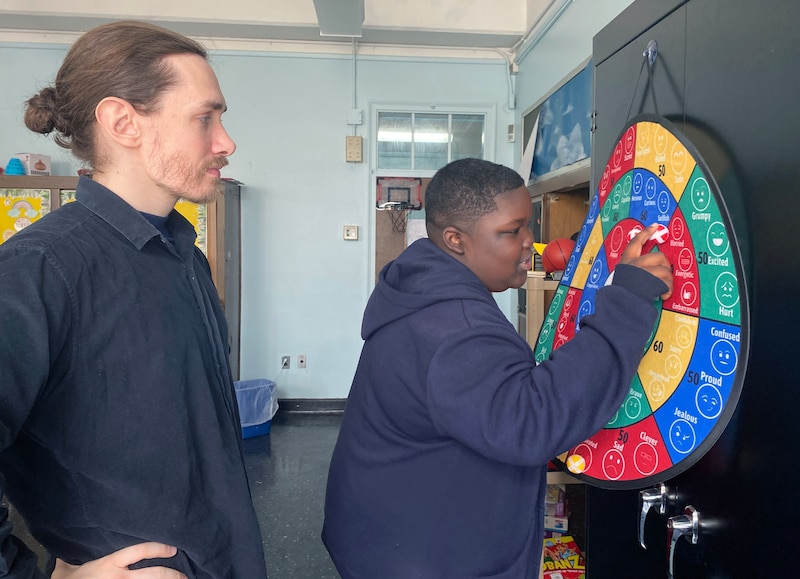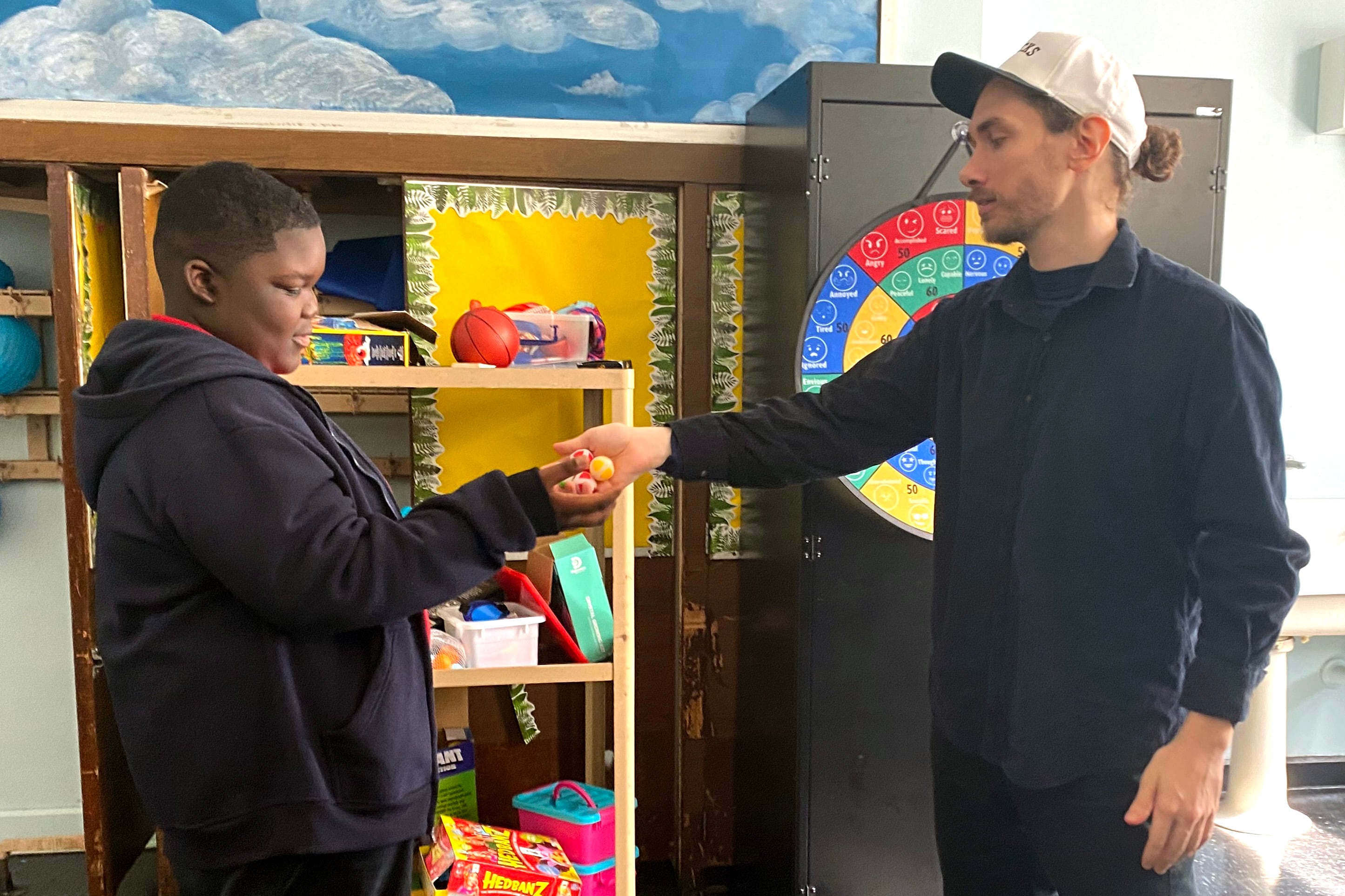Sign up for Chalkbeat New York’s free daily newsletter to get essential news about NYC’s public schools delivered to your inbox.
Eric Tate felt tired.
The 12-year-old from Brooklyn was up late again, playing on his phone and watching movies. He would rather have been home sleeping than in school on that Friday in May.
But Eric perked up when Marshall “Mars” Leonard pulled him from a schoolwide town hall to hang out with him in a space carved out on the second floor in the massive building housing the Meyer Levin Middle School.
Frankly, the tween said, he doesn’t much like school at all, with a major exception.
“I like being here,” said Eric, who wrapped up seventh grade last month.
Eric’s rapport with Leonard goes deep. They bond over horror movies. They play Crazy Eights. And Leonard recently relearned how to teach math to help Eric, who moved his grade up from a 55 to 80. (Leonard admitted to using ChatGPT to help him.)
Leonard is Eric’s mentor. He’s a graduate social work student at Adelphi University, who was placed at the East Flatbush middle school through an organization called the Arthur Project, which prepares clinicians-in-training to provide mentoring that focuses on school, family, friendships, and health to students with unmet academic, social, or mental health needs.
The program takes a therapeutic approach, but it’s not therapy. The students set individualized goals with their mentors through fun 1-on-1 activities and in small groups. For their Saturday community programs, they’ve taken students to the movies, to an escape room, and to play paint ball. The program exclusively focuses on middle school, an often overlooked but challenging time for kids as their bodies and brains are rapidly changing. It’s also an age where professionals are seeing greater mental health challenges.
“We know that kids feel extraordinarily lonely, that they consider self harm and suicide way more often than we want them to,” Jessica Greenawalt, executive director and co-founder of the Arthur Project. “It used to be pretty rare to hear a 10- or 11-year-old-talk about and seriously contemplate or attempt or complete even suicide, and it has become way more common.”
A 2023 Health Department survey on New York City teens found that most worry about the future or something bad happening to them or their families — a potential sign of anxiety, according to city officials. The survey found 48% of teens experienced depressive symptoms, with 11% experiencing severe symptoms, and 16% of the respondents saying they had seriously considered suicide in the previous 12 months.
The Arthur Project has seen significant improvements in youth mental health, with 67% of its participants experiencing improvement in symptoms of anxiety, depression, and post-traumatic stress disorder over the 2023-24 school year, according to the organization’s most recently available data.
Greenawalt said her organization takes into account serious mental health issues while also exploring how they intersect with academic engagement and social emotional wellness. And they look for ways to help students even if they don’t explicitly talk about mental health with a student.
“We’re still supporting mental health by giving our kids a voice, by supporting their engagement, their feelings of connectedness and belonging, their essential skill development,” Greenawalt said. “We might not ever even talk about mental health with a particular student, but their mental health improves because they’re getting this really deep, intensive, self-determined type of support and opportunities, [and to] practice those things in a safe environment with safe adults.”

For Eric, getting help on math was a gamechanger. As Eric’s math grade rose, so did his confidence.
“Remember we were doing long division and I had these crazy methods of doing it because I was kind of just trying to do it intuitively,” Leonard said to Eric, “and it occurred to me … I’m not teaching this right. So then after that I went to chatGPT, and I was like, OK, how do seventh graders do long division?”
Together they figured it out, and math is now Eric’s favorite subject, he said.
Eric and Leonard also talk about emotions, not always an easy feat for many of the tweens. So the mentors sometimes give kids incentives or other prizes to encourage them. And while the mentees might not directly talk about mental health, they do fill out mental health assessments to see how they’ve changed throughout the year.
The program is not mandatory, Leonard said. Giving the students the choice of whether to come is helpful, he believes. His job is to make a space they want to be part of.
“I’m not a teacher. I’m not a disciplinary figure,” Leonard said to Eric. “You get to kind of be yourself and do what you wanna do … Even if we’re not talking about your most intense stuff, it’s still just kind of like a nice zone to relax.”
Amy Zimmer is the bureau chief for Chalkbeat New York. Contact Amy atazimmer@chalkbeat.org.





